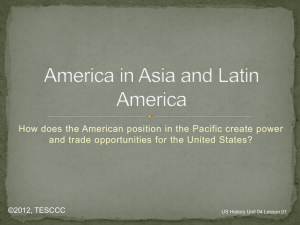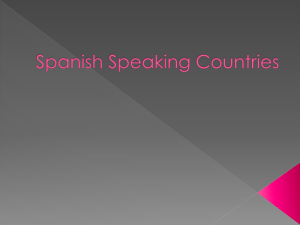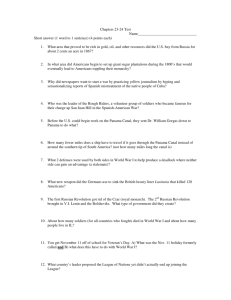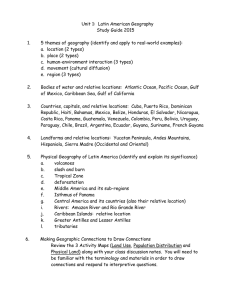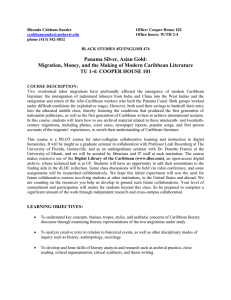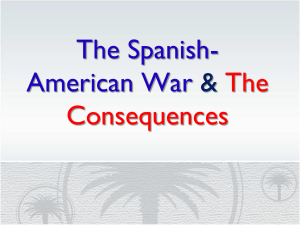LeahRosenbergdraftsyllabus23June ( DOCX )
advertisement
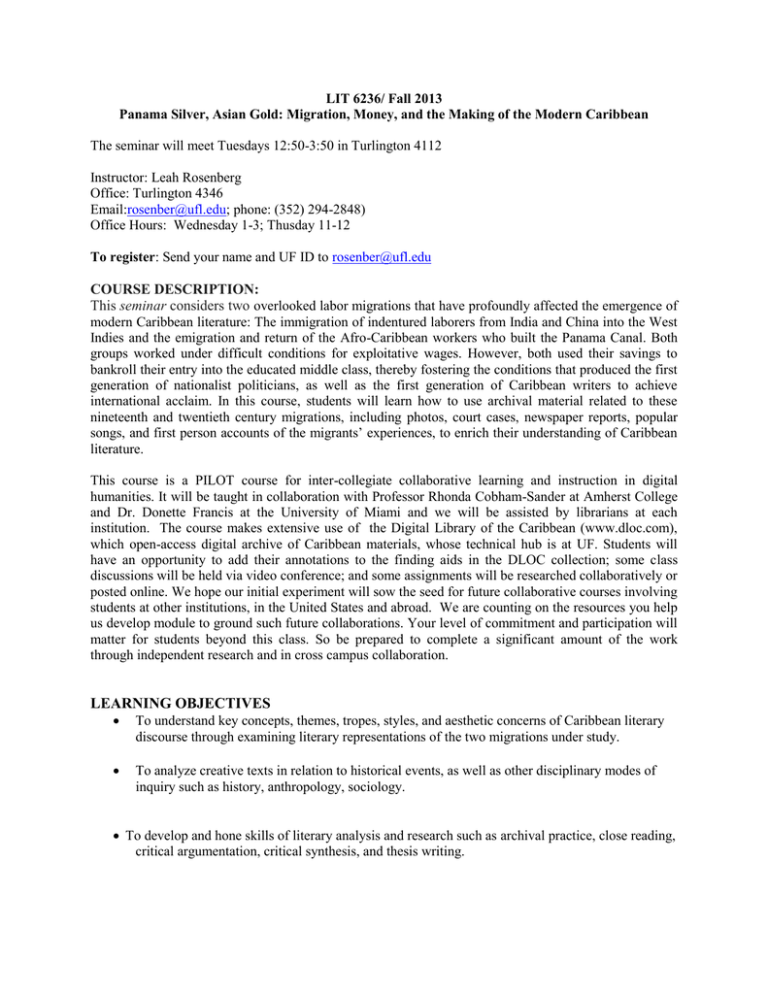
LIT 6236/ Fall 2013 Panama Silver, Asian Gold: Migration, Money, and the Making of the Modern Caribbean The seminar will meet Tuesdays 12:50-3:50 in Turlington 4112 Instructor: Leah Rosenberg Office: Turlington 4346 Email:rosenber@ufl.edu; phone: (352) 294-2848) Office Hours: Wednesday 1-3; Thusday 11-12 To register: Send your name and UF ID to rosenber@ufl.edu COURSE DESCRIPTION: This seminar considers two overlooked labor migrations that have profoundly affected the emergence of modern Caribbean literature: The immigration of indentured laborers from India and China into the West Indies and the emigration and return of the Afro-Caribbean workers who built the Panama Canal. Both groups worked under difficult conditions for exploitative wages. However, both used their savings to bankroll their entry into the educated middle class, thereby fostering the conditions that produced the first generation of nationalist politicians, as well as the first generation of Caribbean writers to achieve international acclaim. In this course, students will learn how to use archival material related to these nineteenth and twentieth century migrations, including photos, court cases, newspaper reports, popular songs, and first person accounts of the migrants’ experiences, to enrich their understanding of Caribbean literature. This course is a PILOT course for inter-collegiate collaborative learning and instruction in digital humanities. It will be taught in collaboration with Professor Rhonda Cobham-Sander at Amherst College and Dr. Donette Francis at the University of Miami and we will be assisted by librarians at each institution. The course makes extensive use of the Digital Library of the Caribbean (www.dloc.com), which open-access digital archive of Caribbean materials, whose technical hub is at UF. Students will have an opportunity to add their annotations to the finding aids in the DLOC collection; some class discussions will be held via video conference; and some assignments will be researched collaboratively or posted online. We hope our initial experiment will sow the seed for future collaborative courses involving students at other institutions, in the United States and abroad. We are counting on the resources you help us develop module to ground such future collaborations. Your level of commitment and participation will matter for students beyond this class. So be prepared to complete a significant amount of the work through independent research and in cross campus collaboration. LEARNING OBJECTIVES To understand key concepts, themes, tropes, styles, and aesthetic concerns of Caribbean literary discourse through examining literary representations of the two migrations under study. To analyze creative texts in relation to historical events, as well as other disciplinary modes of inquiry such as history, anthropology, sociology. To develop and hone skills of literary analysis and research such as archival practice, close reading, critical argumentation, critical synthesis, and thesis writing. To illuminate some of the limitations of the colonial archive records of subaltern and disenfranchised people and the stakes involved in articulating the history of the majority of Caribbean people —for literary writers and scholars. To introduce students to the technology used in digital archiving (producing metadata, exhibit labels, finding guides) and digital humanities (e.g. Omeka, PBworks, timelines, Zotero) and explore challenges posed by digital archiving (how can we not reproduce the colonial structure of existing historical archival materials?). Students are encouraged to produce and publish digital research projects (such as finding guides, curated exhibits, times lines) that will be included in the Digital Library of the Caribbean (www.dloc.com) and when appropriate the conference and exhibits celebrating the Centennial of the completion of the Panama Canal to be held at UF in spring 2014. REQUIREMENTS: Attendance and Participation (in class discussion and responses to wiki postings beyond the required contributions) 15% Weekly Reading and Writing Assignments #1-6 45% of the grade Assignment #7 Meta Data assignment 10% Assignment # 8 Final Research Project 30% Attendance and active participation are mandatory. Twenty percent (20%) of your grade will be based on your active listening, your reading your engagement in class discussions and your attendance of office hours. Readings Assigned readings are listed in the syllabus for each week. On most days there will be a literary text as well as an article or two meant to help you with your assignment. Exercises and Assignments Students will complete weekly assignments during the first half of the course, parts of which they will share online with other students at the three campuses. In the second half of the course you will complete a metadata project, and a final research project. Details about each of your assignments are laid out in the syllabus. Class Attendance and Punctuality. I expect you to come to class on time, and to attend regularly. Failure to do either will affect your final grade. Class Participation. This class is a seminar. All students are expected to come to class having read the assigned materials and having prepared for in-class discussion. “Class participation” is defined here as participating in discussion generated by the class leader, as well as paying attention to and offering respectful critiques of in-class and online presentations by other students. Office Hours. Since this class meets only once a week, you should plan to see me, singly or with a classmate, at least three times in the semester. I have scheduled regular office hours for Wednesdays and Thursdays and I will be checking in at the beginning of the semester to make sure that everyone in the class can make one of the posted times. Week 1 August 27 Introduction Readings: Lowe, Lisa, “Intimacies on Four Continents” in Haunted by Empire: Geographies of Intimacy in North American History. Ed. Ann Laura Stoler Duke UP, 2006. Trouillot, Ralph-Michel, “The Power in the Story,” Silencing the Past (Boston,: Beacon Press, 1995), 1-30. David Dabydeen “Coolie Odyssey,”in They Came in Ships: An Anthology of IndoGuyanese Prose and Poetry (Leeds: Peepal Tree Press, 1998) Selvon, Sam. “Turning Christian” Claude McKay Poem Peasants’ Way o’ Thinking in James, Winston, A Fierce Hatred of Injustice: Claude McKay's Jamaica and His Poetry of Rebellion Verso, 2001) Kincaid, Jamaica. “The Glass House” in My Gardening Book, pp. 143-152 Walcott, Derek. “Exile,” in Collected Poems. pp.100-102 Technology and Library Unit: (with Laurie Taylor) Introduction to PBWorks Week 2 September 3 SEEING THE ARCHIVE IN THE TEXT Reading: Coniff, Michael. “Introduction.” Black labor on a white canal: Panama, 1904-1981 ASSIGNMENT 1 SEEING THE ARCHIVE IN THE TEXT Technology and Library Unit 1: (with Laurie Taylor and Missy Roser) PBWorks basics & Zotero Week 3 September 10 Indentured Women in the Archive Readings: Saidiya Hartman, “ The Dead book,” chapter 7 in Lose Your Mother Verene Shepherd, Maharani’s Misery Mahadai Das “They Came in Ships” Rajkumari Singh “Per Aije” all in They Came in Ships: An Anthology of Indo-Guyanese Prose and Poetry (Leeds: Peepal Tree Press, 1998) ASSIGNMENT 2: READING THE COLONIAL ARCHIVE Guest lecture via Skype: Verene Shepherd Technology and Library Unit: Introduction to dLOC (individual accounts) and other relevant digital resources for the class. Week 4 September 17 The Panama Canal Enters Modern West Indian Literature Rhonda Frederick, “Mythographies of Panamá Canal Migrations: Eric Walrond’s ‘Panama Gold’.” Marginal Migrations: The Circulation of Cultures within the Caribbean. Oxford: Macmillan Press—Warwick University Caribbean Studies, 2003. pp. 43-76.. Herbert de Lisser Susan Proudleigh (Methuen & Co., 1915) available in Olive Senior, “The Colon People: Part I, Jamaica the Neglected Garden,” Jamaica Journal 11, nos. 3 and 4 (1977):62-70 Week 5 September 24 The Construction of identity and Migration in Newspapers Readings: Eric Walrond Tropic Death (“Subjection,” “Panama Gold,” “The Palm Porch,” “The Wharf Rats,” “Tropic Death”) Olive Senior, “Window” in Discerner of Hearts Guest Lecture: Rhonda Frederick Olive Senior “The Colon People: Part II , Jamaica Journal 42 (1978):87-102 ASSIGNMENT 3: REPRESENTING WEST INDIANS IN THE PANAMA CANAL ZONE Week 6 October 1 Indo-Caribbeans enter Modern Caribbean literature Edgar Mittelholzer, Corentyne Thunder (Guyana) (1941) V.S.Naipaul, “His Chosen Calling” in Miguel Street pp36-45 Wahab, Amar. “Mapping West Indian Orientalism: Race, Gender and Representations of Indentured Coolies in the Nineteenth-Century British West Indies,” Journal of Asian American Studies 10:3 (October 2007): 283-311. ASSIGNMENT 4: Working with Newspapers Week 7 October 8 Chinese Caribbean Readings: Chang, Victor. “Light in the Shop” (Story), small axe, No. 2 (1997), pp.103- 108. (fiction) Lee Loy, Anne-Marie, “The Chinese Shop as Nation Theatre in West Indian Fiction,” Anthurium 5:1 (Spring 2007). Richard Fung My Mother’s Place (Video 1990) Albert Chong “Aunt Winnie’s Story” “A Negro Nurse with Chinese Children” taken from the travelogue, The West Indies; painted by A.S. Forrest (1900) Hight, Eleanor M. andGary David Sampson, “Introduction,” Colonialist Photography: Imag(in)ing Race and Place. London: Routledge, 2002. pp.. ASSIGNMENT 5: Visualizing the Archives Week 8 October 15 Listening in the Archive Brodber, Erna. "Oral Sources and the Creation of a Social History in the Caribbean". Jamaica Journal. Digital Library of the Caribbean Bridget Brereton, Bridget Brereton, “Text, Testimony and Gender: An Examination of some Texts by Women on the English-speaking Caribbean, from the 1770s to the 1920s,” chapter 4 in eds. Verene Shepherd, Bridget Brereton, Barbara Bailey. Engendering History : Caribbean Women in Historical Perspective. Kingston: Ian Randle, 1995: 63-93 Mahase, Anna. My mother's daughter: the autobiography of Anna Mahase Snr., 1899-1978.Union Village, Claxton Bay, Trinidad : Royard Pub. Co., 1992 Roman, Fortune Diggers (Film) Nwankwo, Ifeoma. Introduction: Making Sense, Making Selves. Afro-Latin Americans of British Caribbean Descent Latin American and Caribbean Ethnic Studies Volume 4, Issue 3, 2009. pages 221-230 ---- Voices from Our America: Interview with Emiliana Bernard Stephenson pages 331-341 Other/alternative sources: resources: Panama Canal Museum oral histories Voices from Our America. Oral Histories of Afro-Panamanians Persaud, Alice Persaud (1892-1952) Autobiography Week 9 October 22 Contemporary Indo-Caribbean Women Negotiate the Archive Ramabai Espinet, Swinging Bridge ------ “The Invisible Woman in West Indian Literature.” The Invisible Woman in West Indian Literature', World Literature Written in English 29,2: 116-26 ASSIGNMENT 6: Listening in the Archives Week 10 October 29 Contemporary Afro-Caribbean Novelist negotiates the archive on Panama Maryse Conde Tree of Life Week 11 Nov 5 Digital Archiving and the Construction of Knowledge US Senate hearing (starts about halfway down the page). This series includes several Senate hearings about Panama Canal Matters Guest Lecture: Laurie Taylor on Metadata and digital archiving and the Construction of Knowledge Reading: Familiarize yourself with the citations in dLOC 3 sources you have found important. Also look at examples: “News Flash: Vodou Not Voodoo.” Consider the information included and not included and terms used. Week 12 Nov 12 Digital Archiving and the Construction of Knowledge ASSIGNMENT 7: Collaborative Guides and Annotations Due Week 13 November 19 Planning Week for Collaborative Digital Project Assignment for 19 November: Explore the digital projects linked in assignment 8 and consider what project you would like to undertake. You may explore other digital humanities projects and introduce them to the class via the wiki and class discussion. Week 14 November 26 Collaborate Project Continued: First proposal due Week 15 December 3 Joan Flores Guest Presentation on Primary Research on the Panama Canal ASSIGNMENT 8 Part 1: Write a proposal for your project (250 words) which includes: a title, tentative thesis, and list of sources. Guest Lecture: Joan Flores Report on progess towards part 2 of project (proposal explaining the use of technology) due Friday 6 December Final project due 13 December EXPLANATION OF ASSIGNMENTS The first draft or effort towards toward each assignment is due at 9 a.m. on the morning of the class. The final version should be uploaded to the wiki by noon the Friday of that week. Drafts should be posted on your home page and the final version on both your page and the wiki page for the assignment. ASSIGNMENT 1: SEEING THE ARCHIVE IN THE TEXT [due 3/6 September] This assignment helps you understand how and why scholars use archival sources. Choose a book of interest from LINK. Read and analyze its introduction and bibliography using the reading form. Post a paragraph about your findings to LINK. ASSIGNMENT 2: READING THE COLONIAL ARCHIVE [Due 10/ 13September] This assignment introduces you to how scholars negotiate the colonial archive in making meaning. 1. Focus on 1 witness' testimony from Verene Shepherd's Maharani's Misery. How do you evaluate the significance of this testimony? How do you use other testimonies to qualify (e.g., verify, contradict, etc.) this version? 2. What other conditions influence how we read these sources (e.g., additional historical contexts, the acknowledged absence of information, etc.)? 3. Document your reasoning and analysis (500 words) and post to the Wiki page for this assignment. 4. Using Hartman as your model, imagine your version of events (500 words) and post to the Wiki page for this assignment. ASSIGNMENT 3: REPRESENTING WEST INDIANS IN THE PANAMA CANAL Zone [Due 24/27 September] This assignment examines how literary texts transform the historical record. 1. Choose 1 scene from Susan Proudleigh that represents a specific historical event e.g., reasons for migrating to Panama, passage to Panama, encounters with Americans, living conditions, industrial accidents, etc.). 2. Choose 2 related historical sources. 3. How are the West Indian characters represented (e.g., body, race, color, class, gender, skills, profession, and an individual's reasons for migration, etc.)? In the novel? In the 2 historical sources? For each, examine what the author includes and excludes. 4. What do these selections and intepretive choices tell you (500-750 words)? Suggested sources listed in assignment page in PBworks ASSIGNMENT 4: WORKING WITH NEWSPAPERS (Due 1 October) This assignment allows you to think about how newspapers create historical meaning. You may focus on any aspect of Panama or Asian migration for this assignment. Browse the newspapers assigned for your campus. Select a news item related to the migrants. Read the entire issue of the newspaper in which the article appears. What kind of items does this newspaper carry (e.g. ads, editorials, letters, news, literary pieces, cartoons)? What can you tell about the newspaper's readership and political orientation? Write (500-750 words) for the Wiki characterizing the newspaper, and post to the Wiki page for this assignment. ASSIGNMENT 5: VISUALIZING THE ARCHIVES (Due 8 October) This assignment asks you to examine how photography historically has constructed the raced subject. Choose 1 image from the photo gallery. LINK Examine the photo and consider the following: Note the gender of the subjects; their position vis-à-vis, machines, animals, vegetation, buildings or other racial subjects. What do you know about the photographer or what do you imagine he/she was like? Is the photograph dated? Is there a caption? What do these selections and interpretive choices tell you? Write (500-750 words) on the provenance of the photograph and the way it constructs its subject. Paste the photo from the photo gallery into your Wiki entry. ASSIGNMENT 6: LISTENING IN THE ARCHIVES.(Due October 22) This assignment introduces students to oral histories, memoirs, and personal accounts. Choose 1 oral account or memoir. Who is speaking? How do they characterize their relationship to the event they describe? What do these narrative choices tell you Relate (500-750 words) your observations to some aspect of a text you've read so far in the course. ASSIGNMENT 7: COLLABORATIVE GUIDES AND ANNOTATIONS (Due 12 November) This assignment teaches you basic skills in digital archiving, and helps you understand how the digital archive constructs knowledge. Choose 1 primary source relevant to your final project from dLOC. Consider what's included and what's missing in the citation (the citation includes the record information or metadata). For example: See citations for any items by Herbert G. de Lisser, ethnically Jewish and was editor of The Gleaner for nearly 40 years, but there is nothing in the citation to make that known. Letters from the Isthmian Canal Construction Workers, which does not exist in any known online library catalog and is only listed in the bibliography of Rhonda Frederick's Colón Man a Come. In the source you selected, what additional information do you think should be included to make the source more useful for scholars? Complete the form for your selected item, and post to the Wiki. ASSIGNMENT 8: BUILDING A COLLABORATIVE DIGITAL PROJECT This assignment demonstrates how Caribbean Literature engages the archives. This will be a Digital Humanities project (a project for the humanities in the digital age). You may work individually or in a group. For this assignment, you should create a digital project to explicate how Caribbean Literature engages the archives. This digital project should use dLOC, along with any other technologies as appropriate and dictated by the academic intent, to make a contribution to scholarly conversations. For example, your response could be thematic, theoretical, and/or it can use any combination of sources, media, and technologies. Your assignment should draw on any of the assignments created for this course. Please remember to cite all sources properly including your classmates. Components: Part 1: Write a proposal for your project (250 words) which includes: a title, tentative thesis, and list of sources. (Due November 26) Part 2: Review and select an appropriate technology for delivering the project. Write a proposal explaining how the selected technology supports the project. (Due 6 December) Part 3: Design and deliver a digital project. (Due 13 December) Possible examples: Wendy Ewald class work from 2012 Diaries of a Prolific Professor Journal created from class papers (example with Haitian Creole) TimelineJS (simple example, for use with larger projects) Historical book reception (reading of a book with responses to book, and critical analysis) Teaching materials Online exhibits About Face Online exhibits by the University of Miami Online exhibits by the University of Florida Digital scholarship projects As far as the eye/I can see: Caribbean Art & Visual Culture Slave Resistance: A Caribbean Story
